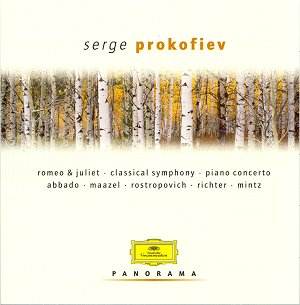Serge PROKOFIEV
(1891-1953)
Classical Symphony in D, Op. 25a. Violin Concerto No. 1in
D, Op. 19b. Romeo and Juliet c - Suite No. 1, Op. 64a;
Suite No. 2, Romeo at Juliet's grave. Alexander Nevsky, Op. 78 - The field
of the deadd. Piano Concerto No. 3 in C, Op. 26e. Visions
fugitives, Op. 22 (excerpts) f. Symphony No. 5 in B flat, Op.
100g.
 aChamber Orchestra of
Europe/Claudio Abbado; bSchlomo Mintz (violin);
bChicago Symphony Orchestra/Claudio Abbado; cNational
Symphony Orchestra of Washington D.C./Mstislav Rostropovich;
dElena Obraztsova (mezzo); dLondon Symphony
Orchestra/Claudio Abbado; eMartha Argerich (piano);
eBerlin Philharmonic Orchestra/Claudio Abbado;
fSviatoslav Richter (piano); gCleveland Orchestra/Lorin
Maazel. Recorded 1965-90.
aChamber Orchestra of
Europe/Claudio Abbado; bSchlomo Mintz (violin);
bChicago Symphony Orchestra/Claudio Abbado; cNational
Symphony Orchestra of Washington D.C./Mstislav Rostropovich;
dElena Obraztsova (mezzo); dLondon Symphony
Orchestra/Claudio Abbado; eMartha Argerich (piano);
eBerlin Philharmonic Orchestra/Claudio Abbado;
fSviatoslav Richter (piano); gCleveland Orchestra/Lorin
Maazel. Recorded 1965-90.
 DG Panorama 469 172-2
[ADD/abcDDD] [150'08]
DG Panorama 469 172-2
[ADD/abcDDD] [150'08]

Definitely more thumbs up than thumbs down. This 'Panorama' release is
intelligently chosen as far as repertoire concerned, my only qualm being
that the six-minute excerpt from Alexander Nevsky appears a bit lonely
all by itself, despite Obraztsova's big, Slavic sound.
Appropriately enough, the set opens with Abbado's clean, charmingly suave
Classical Symphony. It acts as the perfect opener: rhythms are bright
and pointed, the Gavotte has bags of character and the finale is pure,
infectious fun. Mintz's 1984 account of the First Violin Concerto, which
follows, is big-toned and dramatic. The soloist displays astonishing virtuosity
in the vivacissimo Scherzo.
The other concerto included outshines even this, however. Martha Argerich's
fiery, caution-to-the-wind Third Piano Concerto, first issued in 1968, has
lost none of its gripping power in the intervening years. Argerich's fingerwork
is crystalline and the ensemble is unfailingly precise. Richter's Visions
fugitives are perfectly-formed interpretations and cram more of the essence
of Prokofiev into their two-and-a-half minutes than the Clevelanders under
Maazel can muster in the whole of the Fifth Symphony. In particular, Maazel's
first movement lacks the cumulative power to sustain it and the finale is,
basically, faceless. Finally, extracts from Rostropovich's Romeo and
Juliet with the Washington orchestra fail to get to the heart of this
emotive music, despite moments of tenderness.
The Classical Symphony and both of the concertos make this a thoroughly
worthwhile investment, however.
Colin Clarke

